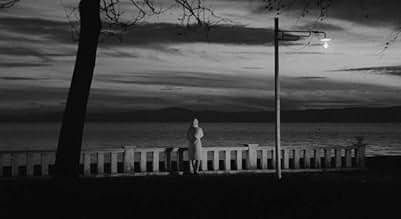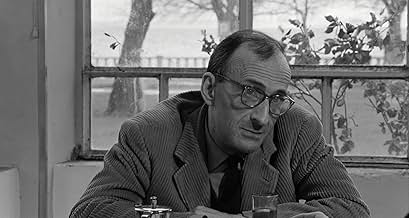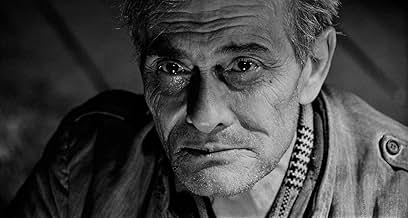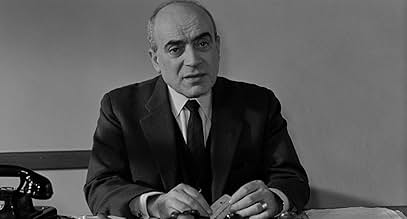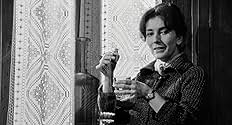IMDb-BEWERTUNG
7,0/10
1681
IHRE BEWERTUNG
Füge eine Handlung in deiner Sprache hinzuWhile visiting his favorite resort town during the off-season, a novelist investigates the apparent suicide of a woman he was infatuated with.While visiting his favorite resort town during the off-season, a novelist investigates the apparent suicide of a woman he was infatuated with.While visiting his favorite resort town during the off-season, a novelist investigates the apparent suicide of a woman he was infatuated with.
Pia Lindström
- Adriana
- (as Pia Lindstrom)
Pier Giovanni Anchisi
- Francesco - Photographer
- (as Piero Anchisi)
Anna Maria Gherardi
- Servant Girl
- (as Anna Gherardi)
Jean Rougeul
- The Journalist
- (Nicht genannt)
Empfohlene Bewertungen
Fascinatingly dark and elusive, 'La Donna Del Lago' (aka) 'The Possessed' (1965) ominously remains a thrillingly enigmatic, majestically mysterious, almost impenetrable crypto-Giallo by the consistently excellent film stylist, Luigi Bazzoni, the prodigiously talented, intellectual auteur behind equally idiosyncratic, doom-laden, darkly dreamt anti-Gialli masterpiece, 'Footsteps on the Moon'(1975). Since 'La Donna Del Lago' was also written by fellow dramatic iconoclast, Gulio 'Death Laid an Egg' Questi, one might certainly expect to experience a similarly oblique tone, and in terms of starkly confounding genre conventions, skewed scrivener, Questi most certainly doesn't disappoint! While some might consider 'Lady of The Lake' to be just another indulgent example of overwrought nouvelle vague-esque cinematic doodling; but to blithely dismiss this eerily elegiac work as mere self-indulgence is, perhaps, to miss out of one of Italian genre cinema's most glacial,immaculately shot, singularly strange, wickedly off-key, noggin-scratchingly unique thrillers!
Recently, I had been impressed with Bazzoni's weird offering FOOTPRINTS (1975); so, when I happened upon this even more obscure (and, by all accounts, rarer) earlier title from him, I decided to check it out and, boy, is it a find for Euro-Cult/Art-house buffs! The film, in fact, can perhaps best be described as an arty semi-giallo; interestingly, it contains several echoes to Bazzoni's later effort: the resort town, the central hotel setting, the strange characters encountered by the hero (in FOOTPRINTS, the bewildered protagonist was a woman), the mystery revolving around a missing person not to mention the deliberate (and deliberately-paced) oblique narrative.
What is immediately arresting here (in spite of the somewhat fuzzy quality of the print on display) is the supreme style allotted to the film's look which is wintry, bleak and forbidding by its two directors (incidentally, this was Rossellini's only stint in such capacity!); to this end, they wisely recruited veterans such as cinematographer Leonida Barboni (but who also adopts peculiar framing throughout, none more so that the pan in extreme close-up of a character's face with the gleaming lake for backdrop!) and production designer Luigi Scaccianoce. However, equally important to the fabric of the piece are the contributions of Renzo Rossellini (supplying an appropriately moody score) and editor Nino Baragli (whose frequent jump-cuts and seamless juxtaposition between reality, recollection and outright fantasy create a genuine and admirably disorientating effect on the viewer). Incidentally, THE POSSESSED a misleading English title but a literal translation of the original, THE LADY OF THE LAKE, would be no less ambiguous! was co-written (with Bazzoni and Franco Rossellini) by Giulio Questi; for the record, as a director in his own right, the latter went on to make such idiosyncratic yet haunting revisions of genre convention as the Spaghetti Western DJANGO, KILL IF YOU LIVE, SHOOT! (1967) and the giallo DEATH LAID AN EGG (1968).
The cast is compact but exceptionally noteworthy: Peter Baldwin (very good in Dino Risi's LOVE IN ROME [1960] here, in what I assume to be his most significant role, he's downright excellent!), Salvo Randone (as the owner of the hotel whom the hero suspects of both lechery and murder, he manages to alternate between a genial and sinister countenance throughout), Valentina Cortese (a typically fine performance, though her weather-beaten looks make it hard to convince us she's Randone's daughter even if a reasonable age gap separates the two actors!), Philippe Leroy (having appeared in so many films from the 1960s and 1970s that I've watched in recent years and, thanks also to his remarkable versatility, the French actor has become a firm favorite of mine!), Virna Lisi (while undeniably sensual, her contribution basically amounts to an extended cameo since her character, who seems to have turned the heads of virtually the entire male cast at some point, is already dead when the film opens and we only see the girl in flashback/fantasy sequences!) and Pia Lindstrom (a rare cinematic appearance by Ingrid Bergman's elder daughter being similarly steeped in mystery, alas, she too is barely given time to create a flesh-and-blood character but, then, her resultant fragile performance emerges to be all the more moving for it!).
The plot concerns an author (Baldwin) arriving off-season at a resort town he habitually retired to in order to work, hoping to meet again a servant-girl (Lisi) he's enamored of employed at the hotel run by Randone; however, he's told she's no longer there but notices that her cloak is still hanging in the closet, follows a woman in the streets he sees wearing it (and is eventually disappointed to learn the outfit now belongs to Lisi's replacement). Typically, he decides to delve deeper into the mysterious circumstances surrounding the former maid's demise still, Randone and his family (Cortese assists in the managing of the establishment while brother Leroy owns a butcher shop situated in the courtyard of the hotel itself and, coincidentally, has just returned from his honeymoon with wealthy but naïve and sickly bride Lindstrom) generally evade his probing. Even the only man who's willing to help at first a hunchbacked local photographer (I'm not sure about the actor's name but his face is awfully familiar!), who presents Baldwin with a photo in which Lisi is visibly pregnant suddenly opts out and leaves town in a hurry!; then, there's Lisi's alcoholic bum of a father who seems to have nothing of value for the hero to work on venting the anger and frustration over his daughter's loss by bursting into vitriolic (but ineffectual) nightly rants outside the hotel windows! At one point, Lindstrom makes a weak attempt to communicate with Baldwin but, before they can meet (he had previously noticed the girl walking aimlessly by the lake at night a number of times, but never quite mustered the nerve to confront her), she too is found dead! Eventually, the hero starts to think he may have gotten it all wrong: perhaps Lisi wasn't so much a victim of circumstance (periodically abused by both father and son!) as a femme fatale who got killed simply because she was too greedy.
The final revelation then, takes things in another direction altogether; while certainly effectively handled, the scene does perhaps constitute a slight let-down as it won't surprise anyone familiar with Mario Bava's THE GIRL WHO KNEW TOO MUCH (1963), actually the film credited with originating the giallo tradition, in which Cortese also features
What is immediately arresting here (in spite of the somewhat fuzzy quality of the print on display) is the supreme style allotted to the film's look which is wintry, bleak and forbidding by its two directors (incidentally, this was Rossellini's only stint in such capacity!); to this end, they wisely recruited veterans such as cinematographer Leonida Barboni (but who also adopts peculiar framing throughout, none more so that the pan in extreme close-up of a character's face with the gleaming lake for backdrop!) and production designer Luigi Scaccianoce. However, equally important to the fabric of the piece are the contributions of Renzo Rossellini (supplying an appropriately moody score) and editor Nino Baragli (whose frequent jump-cuts and seamless juxtaposition between reality, recollection and outright fantasy create a genuine and admirably disorientating effect on the viewer). Incidentally, THE POSSESSED a misleading English title but a literal translation of the original, THE LADY OF THE LAKE, would be no less ambiguous! was co-written (with Bazzoni and Franco Rossellini) by Giulio Questi; for the record, as a director in his own right, the latter went on to make such idiosyncratic yet haunting revisions of genre convention as the Spaghetti Western DJANGO, KILL IF YOU LIVE, SHOOT! (1967) and the giallo DEATH LAID AN EGG (1968).
The cast is compact but exceptionally noteworthy: Peter Baldwin (very good in Dino Risi's LOVE IN ROME [1960] here, in what I assume to be his most significant role, he's downright excellent!), Salvo Randone (as the owner of the hotel whom the hero suspects of both lechery and murder, he manages to alternate between a genial and sinister countenance throughout), Valentina Cortese (a typically fine performance, though her weather-beaten looks make it hard to convince us she's Randone's daughter even if a reasonable age gap separates the two actors!), Philippe Leroy (having appeared in so many films from the 1960s and 1970s that I've watched in recent years and, thanks also to his remarkable versatility, the French actor has become a firm favorite of mine!), Virna Lisi (while undeniably sensual, her contribution basically amounts to an extended cameo since her character, who seems to have turned the heads of virtually the entire male cast at some point, is already dead when the film opens and we only see the girl in flashback/fantasy sequences!) and Pia Lindstrom (a rare cinematic appearance by Ingrid Bergman's elder daughter being similarly steeped in mystery, alas, she too is barely given time to create a flesh-and-blood character but, then, her resultant fragile performance emerges to be all the more moving for it!).
The plot concerns an author (Baldwin) arriving off-season at a resort town he habitually retired to in order to work, hoping to meet again a servant-girl (Lisi) he's enamored of employed at the hotel run by Randone; however, he's told she's no longer there but notices that her cloak is still hanging in the closet, follows a woman in the streets he sees wearing it (and is eventually disappointed to learn the outfit now belongs to Lisi's replacement). Typically, he decides to delve deeper into the mysterious circumstances surrounding the former maid's demise still, Randone and his family (Cortese assists in the managing of the establishment while brother Leroy owns a butcher shop situated in the courtyard of the hotel itself and, coincidentally, has just returned from his honeymoon with wealthy but naïve and sickly bride Lindstrom) generally evade his probing. Even the only man who's willing to help at first a hunchbacked local photographer (I'm not sure about the actor's name but his face is awfully familiar!), who presents Baldwin with a photo in which Lisi is visibly pregnant suddenly opts out and leaves town in a hurry!; then, there's Lisi's alcoholic bum of a father who seems to have nothing of value for the hero to work on venting the anger and frustration over his daughter's loss by bursting into vitriolic (but ineffectual) nightly rants outside the hotel windows! At one point, Lindstrom makes a weak attempt to communicate with Baldwin but, before they can meet (he had previously noticed the girl walking aimlessly by the lake at night a number of times, but never quite mustered the nerve to confront her), she too is found dead! Eventually, the hero starts to think he may have gotten it all wrong: perhaps Lisi wasn't so much a victim of circumstance (periodically abused by both father and son!) as a femme fatale who got killed simply because she was too greedy.
The final revelation then, takes things in another direction altogether; while certainly effectively handled, the scene does perhaps constitute a slight let-down as it won't surprise anyone familiar with Mario Bava's THE GIRL WHO KNEW TOO MUCH (1963), actually the film credited with originating the giallo tradition, in which Cortese also features
The famous writer Bernard (Peter Baldwin) travels to a small town nearby a lake to spend vacation out of season in the winter. He check in an old hotel owned by Enrico (Salvo Randone) and his daughter Irma (Valentina Cortese) expecting to meet the maid Tilde (Virna Lisi), from whom he had a crush last time he visited the town. However, he discovers that Tilde has committed suicide and when he meets the local photographer (Piero Anchisi), Bernard learns that she was pregnant. He becomes obsessed to find whether she really committed suicide and to guess what really happened. When Enrico's son Mario (Philippe Leroy) and his wife Adriana (Pia Lindstrom) arrive at the hotel, Bernard has daydreams about the fate of Tilde.
"La donna del lago", a.k.a. "The Lady of the Lake", is a dark and mysterious Italian film with a simple and inconclusive story. The black and white cinematography is magnificent, with great use of lighting and shadows. The cast is also excellent, supported by an intriguing screenplay with great narrative. Bernard's daydreams are interesting, showing what he is thinking and changing his reality many times. "La donna del lago" is for specific audiences that will certainly enjoy this type of story. My vote is seven.
Title (Brazil): "A Mulher do Lago" ("The Lady of the Lake")
"La donna del lago", a.k.a. "The Lady of the Lake", is a dark and mysterious Italian film with a simple and inconclusive story. The black and white cinematography is magnificent, with great use of lighting and shadows. The cast is also excellent, supported by an intriguing screenplay with great narrative. Bernard's daydreams are interesting, showing what he is thinking and changing his reality many times. "La donna del lago" is for specific audiences that will certainly enjoy this type of story. My vote is seven.
Title (Brazil): "A Mulher do Lago" ("The Lady of the Lake")
Glorious first film from Luigi Bazzoni, who would go on to make, The Fifth Cord and Footprints. Here with wonderful b/w cinematography from Barboni we have a straightforward enough, if noirish, beginning, gradually deepening into something resembling a gothic horror before developing before our very eyes into something more resembling a giallo. Always good to look at and with persuasive and involving dialogue, this engages from the start and although the tale is leisurely told, occasionally resembling Last Year At Marienbad, we never loose interest. Yet another near lost gem wonderfully restored thanks to Arrow. Oh and I almost forgot, we get a dreamy substantial cameo from the lovely Virna Lisi.
I saw this on late-night local TV in the early 70s, tolerably dubbed, under the title LOVE, HATE AND DISHONOR, and was immediately taken by it's eerie, VAMPYRE-like style.
It never played on TV again, and in the late 70s to 90s I searched for it in vain. I did catch a reference to it under the title Possessed in the Encyclpedia of Horror Movies.
Finally found a poor quality English-subtitled VHS a few years back from VideoSearch of Miami and enjoyed it once again. I guess I have to add two more lines of text to meet the minimum requirement to post. I hope this is enough
It never played on TV again, and in the late 70s to 90s I searched for it in vain. I did catch a reference to it under the title Possessed in the Encyclpedia of Horror Movies.
Finally found a poor quality English-subtitled VHS a few years back from VideoSearch of Miami and enjoyed it once again. I guess I have to add two more lines of text to meet the minimum requirement to post. I hope this is enough
Wusstest du schon
- VerbindungenReferenced in Once Upon a Time In... Hollywood (2019)
Top-Auswahl
Melde dich zum Bewerten an und greife auf die Watchlist für personalisierte Empfehlungen zu.
- How long is The Possessed?Powered by Alexa
Details
- Erscheinungsdatum
- Herkunftsland
- Sprache
- Auch bekannt als
- Love, Hate and Dishonor
- Drehorte
- Brunico, Bolzano, Trentino - Alto Adige, Italien(lakeside town: street views, shops, train station)
- Produktionsfirmen
- Weitere beteiligte Unternehmen bei IMDbPro anzeigen
- Laufzeit1 Stunde 25 Minuten
- Farbe
- Sound-Mix
- Seitenverhältnis
- 1.85 : 1
Zu dieser Seite beitragen
Bearbeitung vorschlagen oder fehlenden Inhalt hinzufügen


